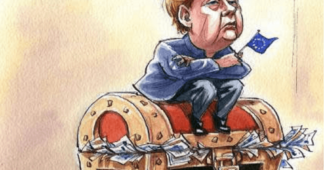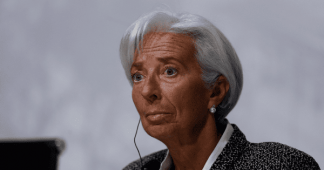Without a serious change in governance, there is a risk that the new rules of the Stability Pact will lead to a repetition of old mistakes.
Sergio Cesaratto teaches European monetary and fiscal policies at the University of Siena. He is author of Heterodox Challenges in Economics – Theoretical Issues and the Crisis of the Eurozone, Springer, 2020 (reviewed by BNE here).
Originally published by il sussidiario 3 December 2021 here
The interview was conducted by Lorenzo Torrisi
The reform of the Stability Pact will be back on the agenda in 2022, which will also be the twentieth anniversary of the start of circulation of the euro, an anniversary to which Sergio Cesaratto has dedicated his latest working paper (in English), which can be downloaded here.
At the end of the meeting between Olaf Scholz and Mario Draghi on 21 December, the former recalled that the rules of the Stability Pact had worked and shown some flexibility, while the latter said he was optimistic that an agreement could be reached on the reform of those rules. Will an agreement really be reached? “Agreements – says Sergio Cesaratto, Professor of European Monetary Policy at the University of Siena – can always be found. Of course it is an uphill road. The Italian government would do well to emphasise in all circumstances how much our country has paid for its mismanagement of the financial crisis, while Berlin gained on it (see Cesaratto’s previous article on Brave New Europe). According to Cesaratto “A German solution will probably be reached”.
What do you mean by that?
The German government, in order to comply with the balanced budget, will finance the huge expenditure on green and digital transition outside the budget In Europe, if all goes well, forms of stabilising European funding such as the Sure fund or the Recovery fund can be found envisaged. Of course, the next step is to coordinate fiscal policies, and monetary policy. It is widely recognised that this is essential for a well-functioning monetary union. Here it will be difficult to achieve anything because certain principles are also enshrined in the Treaties, which are difficult to change. But the ECB itself has changed in recent years, and its economists have denounced how the Bank was left alone in the last decade to deal with the crisis, while fiscal policy was working against it (see here). It is too early to say whether Joachim Nagel, the next president of the Bundesbank, will be a no-to-everything like Jens Weidmann, or more adept at pushing through the German view that monetary policy should refrain from too expansive orientations. Certainly Nagel and the new finance minister Lindner are representatives of a Germany incapable of offering leadership. And Olaf Scholz’s statements are also a sign of continuity.
In recent days, an axis seems to have been created between Rome and Paris with the aim of revising the rule on the deficit/GDP in such a way as to deduct certain investments, particularly concerning the ecological and digital transitions. Would this be a positive change?
Indeed, this is perhaps the possible way forward: safeguard the fiscal objectives, but Europeanise the financing of public investment. The Italian government should more forcefully impose a change of language on Europe, from words like “inclusion” and similar things that do not mean anything, to objectives of guarantee and convergence on employment, rights, education, health… The fiscal objectives should be and hopefully will be revised: away with the objective of 60% of the public debt to GDP ratio in 20 years; incalculable and perverse parameters such as the output gap; block any granting of greater powers to technocratic bodies such as the European Stability Mechanism. There can be no mechanical rules, but the danger is that mechanical rules will be replaced by others that are only ostensibly more reasonable. It is the Commission that must decide, and do so by looking at the situation country by country. The mistakes of past decades cannot be repeated. The economic and social sustainability of economic policy measures is the priority, not absurd fiscal targets that should be always and everywhere valid. The joint article in The Financial Times by Draghi and Macron is a step forward.
This change in the deficit rules would also be “decisive” with respect to the problems highlighted by Draghi himself, according to whom the rules of the Stability Pact “did not work well. They were pro-cyclical, they aggravated the problems of countries in crisis, and they did not support the nations that needed it”?
There is nothing decisive, especially in such a “baleful” creature as the monetary Europe. As we have said, the European mistakes of the past, which Italy is still paying for, cannot be repeated. What is needed is flexibility and intelligence. Social and economic sustainability, the progress of each country and convergence, should be the axis of European governance.
2022 will be the 20th anniversary of the euro. What would you make of this experience of a single European currency?
In fact, the euro was technically born in 1999 when the exchange rates between the participating currencies were irreversibly fixed. It is true, however, that euro coins and banknotes began to circulate on 1 January 2002. The Italian participation in the euro was sustained by the centre-left élite which held that only a European anchor would have pulled Italy out of a disorderly, inflationary, conflict-ridden model. An initial choice was made of joining the European Monetary System in 1979. The EMS was an exchange rate agreement that was transformed into the euro in 1999. The liberalisation of capital movements, the EMS and the “divorce” between the Bank of Italy and the Treasury in 1981 were a dramatic disinflationary “regime change”. This would also have required restrictive fiscal policies, which the governments of the 1980s did not adopt, favouring growth, often unfortunately with misguided public spending.
And in fact the public debt grew very large…
Yes, that unsustainable mix of a fixed exchange rate, free capital movements, and an expansionary fiscal stance was the cause of the explosion of public debt we are still carrying. After the momentary (and beneficial) exit from the Sme between 1992 and 1996, the path to the euro was more consistently accompanied by austerity. As a result, since 1995 productivity growth has stagnated. Deflation was achieved at the price of an impoverished country. Were other paths possible? Certainly the neo-liberal reformism of the élite that led Italy into the European Stability Mechanism and the euro failed. Was another reformism possible? The question is also valid for today, although in the euro the roads are narrower. Europe must do its part, and we must do ours. Unfortunately, the underbelly of the country is not reformist (in the socialist sense), and the prevailing electoral trends are for bigoted, disqualified, conservative political forces. What renewal can ever come from them? Just think of their irresponsible behaviour in the fight against the pandemic. Italy does not need Ms or Mrs Bolsonaro. But the left must learn from Chile, which all progressives look to with hope and sympathy.
The ECB has raised its inflation estimates for 2022, almost doubling them. However, it does not expect to raise rates, as the Fed or the BoE (which has already started to increase them) do. What do you think?
For Italy this is, of course, a good thing, although, of on the other hand, inflation is not. The sustainability of public debt is notoriously sensitive to interest rates. Quantitative easing should be continued, and bonds already bought held until maturity to reinvest the proceeds in new bonds. But a European tightening where inflation is imported would plunge us into stagflation. We will see, however, whether the recovery will continue at the expected pace, or whether a resurgence of the pandemic will put the brakes on it. A possible rise in interest rates, however, might not be a problem if the spreads with German bonds are adequately reduced, i.e. German rates would rise while Italian ones would not.
Can this be achieved?
We need some form of European insurance on Italian debt, which a new governance could and should offer in some way. Italy has already paid, without reason, for its past mistakes. The EU and Germany owe us compensation.
Published at braveneweurope.com
We remind our readers that publication of articles on our site does not mean that we agree with what is written. Our policy is to publish anything which we consider of interest, so as to assist our readers in forming their opinions. Sometimes we even publish articles with which we totally disagree, since we believe it is important for our readers to be informed on as wide a spectrum of views as possible.











